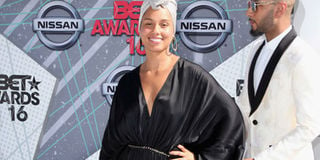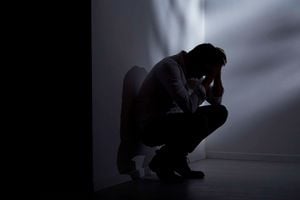Will Kenyan women catch Alicia Keys #nomakeup bug?

Singer Alicia Keys attends the 2016 BET Awards at the Microsoft Theater on June 26, 2016 in Los Angeles, California. PHOTO | AFP
What you need to know:
- A few weeks back a journalist tweeted me a link to a related story, and asked if I thought Kenyan women should embrace #nomakeup.
- Bare-faced celebrities are not an anomaly. Keys wrote an editorial on 31 May 2016. I, like many, have loved Keys since her cornrows knocked beads as she played her piano. Male peers were in love with her breathtaking beauty, a soulful class act. They wanted to collectively “wife” her. She has since married and is a mother. But the #nomakeup movement is not making everyone happy.
Singer Alicia Keys recently left the gym and headed to a scheduled shoot for her new album. Hair swaddled in a scarf with a cap on top, possibly all dewy, glowy and radiant from a great workout — trust me, it happens — the photographer took one look at her and declared he wanted to do a shoot. It was raw and perfect. The concept glorious.
The 15-time Grammy winner did precisely what any woman in the limelight would. She panicked. In fact, what she said, exactly, was, “I was shocked. Instantly, I became a bit nervous and slightly uncomfortable. My face was totally raw. I had on a sweatshirt! As far as I was concerned, this was my quick run-to-the-shoot-so-I-can-get-ready look, not the actual photo-shoot look. I want to be real, but this might be too real!!”
Her stunning pictures, posts and latest music video, all shot makeup-free include a cover for Vanity Fair. This week she took a naked battle to the biggest ground ever — a red carpet appearance at the BET Awards.
A few weeks back a journalist tweeted me a link to a related story, and asked if I thought Kenyan women should embrace #nomakeup.
Bare-faced celebrities are not an anomaly. Keys wrote an editorial on 31 May 2016. I, like many, have loved Keys since her cornrows knocked beads as she played her piano. Male peers were in love with her breathtaking beauty, a soulful class act. They wanted to collectively “wife” her. She has since married and is a mother. But the #nomakeup movement is not making everyone happy.
BRAND AMBASSADOR
Hitting over 15 million and counting on Instagram alone, #nomakeupmovement dates back to 2010 on social media. The problem is now it is polarising, cited as disempowering, pitting “natural beauties” against others.
A thread shaming women who do not have flawless skin, credited with glorifying and reaffirming the worship of clear, perfect skin. Faces with acne, scarring, pigmentation, eczema or any brand of imperfection attracts cyberbullying and triggers insecurities. Enough women insist it’s easy for Keys to subscribe #nomakeup because, look at her. Keys said she has never felt more beautiful in her entire life.
She also sings, “In the morning from the minute that I wake up / What if I don’t want to put on all that makeup /Who says I must conceal what I’m made of/Maybe all this Maybelline is covering my self-esteem.”
Yet observers think she can say and do that because she’s gorgeous. It doesn’t hurt that at 35 years, she looks like a freckled teenager without her makeup.
Critics say #nomakeup is purely designed to promote her latest album, keep her relevant and boost sales. The most disgruntled ones recall Keys’ struggles with severe acne, memorialising images of her “bad skin”, unhappy with her role as face and celebrity spokesperson of renowned acne brand Proactiv, declaring she obviously did more than Proactiv did for her skin.
That with her cured, perfect, flawless skin they would have respected her more had she done this when battling acne. It is akin to the good hair/bad hair debate at present. I would applaud #nomakeup if it didn’t trigger women to cheat their way through with the no makeup makeup, judge women who love makeup and if it wasn’t so tied to a misunderstanding of Keys, who had a personal epiphany and in her ecstasy shared it with the world, not expecting it would grow shaming tentacles.
I love the transformative power of makeup. I am not about to pretend I will embrace this hashtag. In my career I have seen beautiful women become emotional after getting a makeover.
Men lie about disliking makeup because, let’s be candid, at the end of the day it has to come off. She can’t sleep with and wake up in it. You do get to see the “real” her.
Also women are insecure about their makeup application skills. Agreed, women can be addicted to, find themselves feeling less attractive without, or hide behind makeup. It should not be rare finding women at ease and empowered whether with or without makeup.
We put too much emphasis on makeup without understanding its playful and confidence-giving qualities. Women need to trust in their own beauty without validation. That way, no-one is surprised when a hashtag only serves to bring what we really feel and think out of the woodwork.





